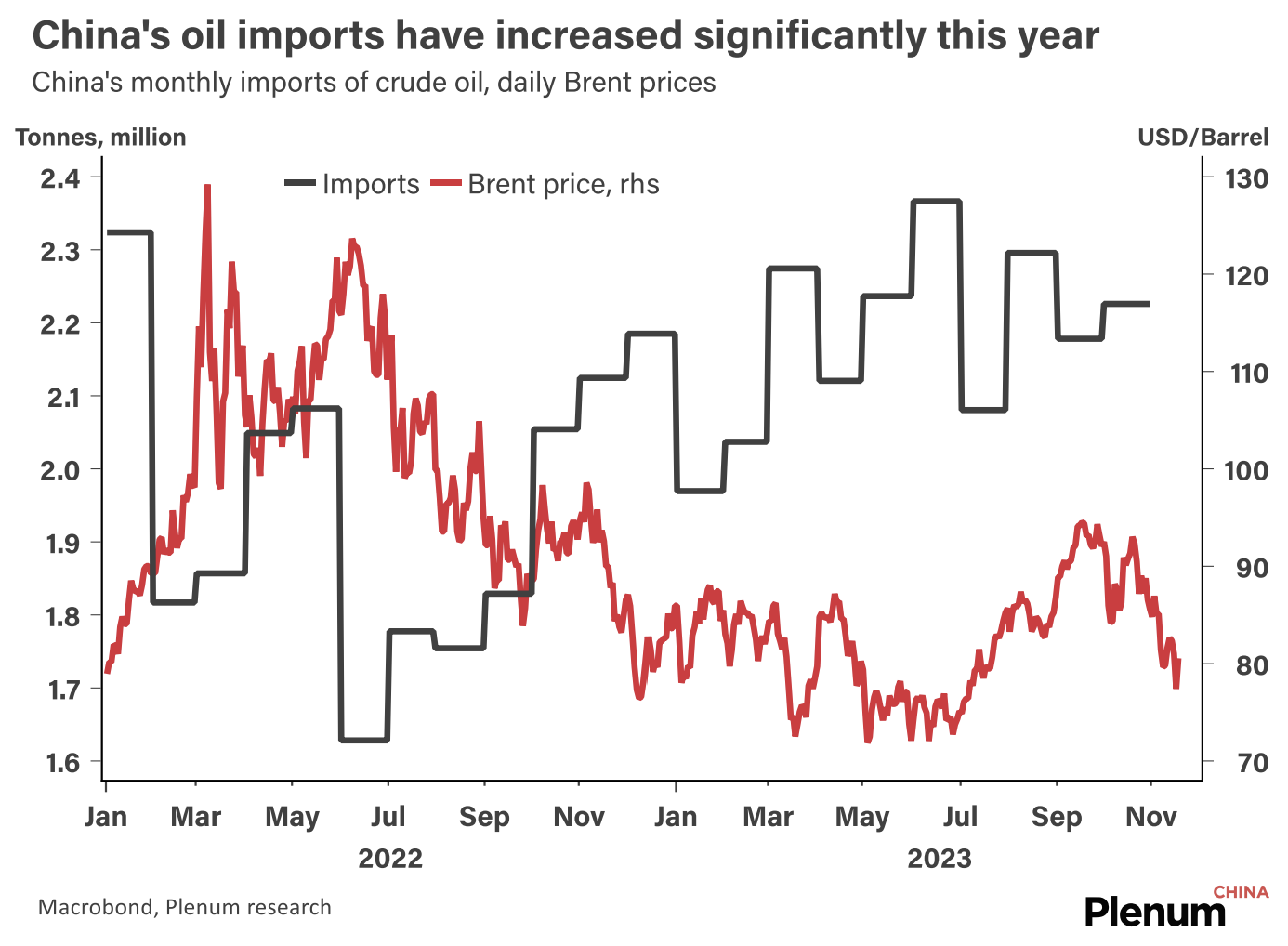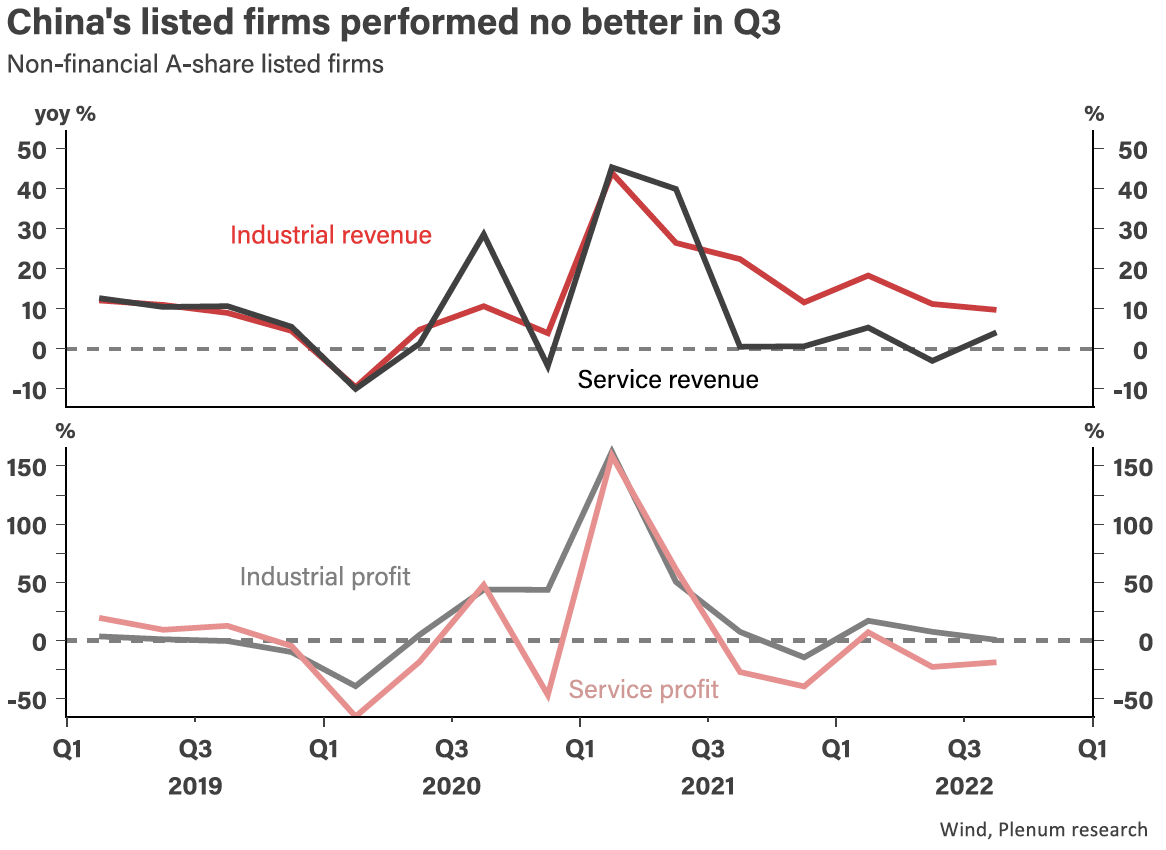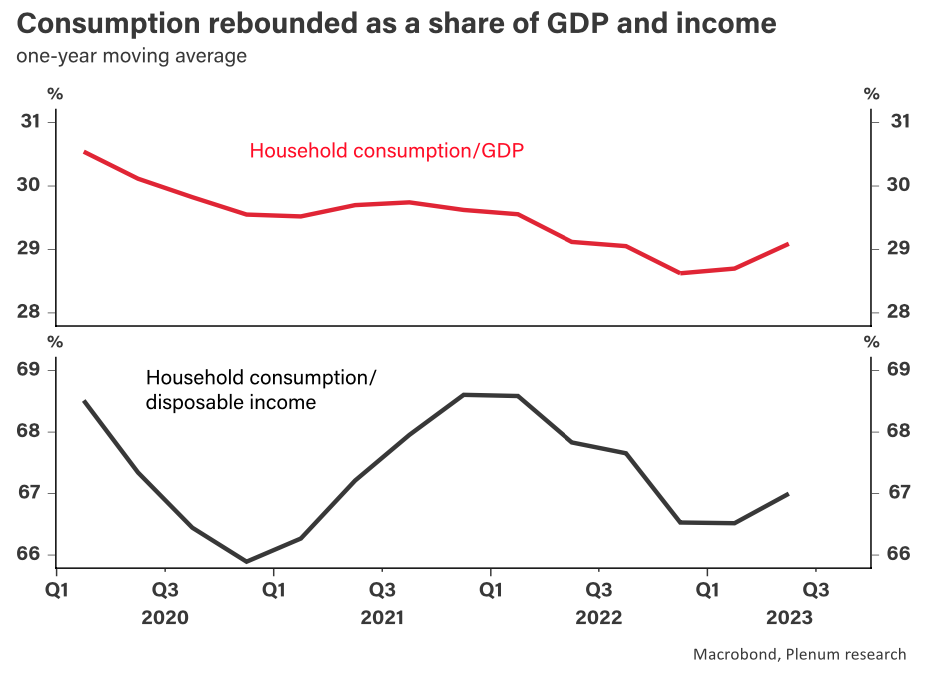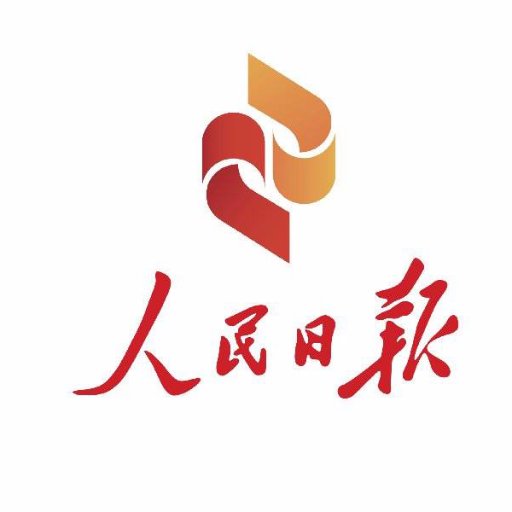
China’s oil demand has turned out much stronger than expected and may end up accounting for 75% of global growth in 2023.

China’s oil demand has turned out much stronger than expected and may end up accounting for 75% of global growth in 2023.

People seem to be cutting back on excessive saving, with consumption of services showing strong development.

Exports and real estate continue to be a drag on the economy, but household spending is recovering well.
On 11 June 2019, Fuyang (a prefecture of Anhui province) Party Secretary Li Ping (李平) was dismissed from the position without indication of where he was going next. On the same day, incumbent Anhui Vice Governor Yang Guangrong (杨光荣) was concurrently appointed as Fuyang Party Secretary. It is very abnormal for a provincial vice governor to take concurrent appointment as a prefecture’s party secretary. There are many occasions where a provincial CCPSC member, which also affords the vice-provincial ranking as vice governor, may take a prefectural position. For example, provincial capital party secretaries across China are all taken by provincial CCPSC members, while some other prefectures with economic importance or political significance (such as Yan’an and Zunyi, the two cities significant in CCP history) may also be headed by provincial CCPSC members. Yet, having a provincial vice governor taking concurrent appointment as a prefecture’s party secretary is extremely rare, primarily because the vice governor him/herself already has a full plate (each one of the vice governors of a province has a portfolio to cover). Therefore, Yang Guangrong’s concurrent appointment to Fuyang is most certainly not an elevation of Fuyang’s status—it is because Fuyang under former party secretary Li Ping’s watch caused huge problems. It was quickly confirmed on 12 June 2019 that Fuyang is indeed in trouble—according to Anhui Daily published on that date, an Anhui CCP Committee Warning Conference (安徽省委警示教育座谈会) was convened on 11 June 2019 where Anhui Party Secretary Li Jinbin (李锦斌) addressed the local officials in Fuyang, along with five other provincial leaders attending the conference. Fuyang is being charged of formalism and bureaucratism. According to the report of a central inspection group that inspected Fuyang in 2018, the prefectural government spent funds that were supposed to be dedicated to poverty alleviation to paint the walls in rural area to make villages look fancier and “seemingly” out of poverty. A single township spent CNY 3.9 million in 2018 to paint the walls, while nepotism was also identified in such process and most of the wall paints did not even meet quality standard. According to official document, some walls were painted four times in a single year. As much as CNY 600,000 of poverty alleviation funds were spent by the government to film a documentary that demonstrates the “good work” of local government. At the same time, the prefectural government launched a demolition campaign in 2018, in which thousands of houses in rural areas were demolished, leaving villagers nowhere to live. The books that were supposed to keep track of distribution of poverty alleviation funds to individual families were also fabricated, while many illiterate households had their books signed by village officials without actually receiving the money. To be clear—this is not going to be a one-off issue only found in Anhui—with a hard deadline to pull everyone out of poverty by 2020, local officials have been hard charged to at least get the numbers right on paper. This means that some local villagers who are out of poverty on paper may still live under the poverty line, while some businessmen may simply take advantage of local government’s rush and exploit the poverty alleviation funds for their own profit. Tianjin and Henan already held similar warning meetings on formalism and bureaucratism in poverty alleviation on 21 June 2019. Anhui’s incident is particularly alarming, although not really picked up by international media covering China, who as always focus on the “tigers”—while the names and numbers of tigers are indeed astonishing, they are quite remote to the daily life of ordinary Chinese. What happened in Anhui intrudes into the daily life of ordinary people and is hence taken very seriously by the top leadership.

From 14 to 22 May 2019, People’s Daily, the single-most important mouthpiece of the Chinese Communist Party (CCP), published a series of nine commentaries written by “Zhong Sheng” (钟声, “Bell Tone” by literal translation), which is a pseudonym used by People’s Daily’s International Department since November 2008 for commentaries on China’s position and proposition on major international issues and China-related topics. Below is a list of all nine commentaries with their original Chinese title, the English translation of title, and the original People’s Daily web links. We’ve summarized the main arguments of each commentary, which may be provided upon request. Contact us or send us an email at team[at]plenum.ai to receive the full analysis. Date/Page/Section Chinese Title/English Translation/Link 14 May 2019 Page 3 Left Section 谁在“为赋新词强说愁”(钟声)——“美国吃亏论”可以休矣 Who Is “Feigning Sorrow to Compose New Verses”?—Argument of United States Being Taken Advantage of Should Stop by Now http://paper.people.com.cn/rmrb/html/2019-05/14/nw.D110000renmrb_20190514_1-03.htm 15 May 2019 Page 4 Left Section 不要陶醉于自欺欺人的“胜利”(钟声)——“加征关税有利论”可以休矣 Do Not Be Enchanted by Self-Deceiving “Victory”—Argument of Additional Tariffs Being Good for United States Should Stop by Now http://paper.people.com.cn/rmrb/html/2019-05/15/nw.D110000renmrb_20190515_3-04.htm 16 May 2019 Page 4 Right Section 谁在“出尔”,谁在“反尔”(钟声)——“中国出尔反尔论”可以休矣 Who Is Contradicting and Backtracking Itself?—Argument of China Being Contradicting Should Stop by Now http://paper.people.com.cn/rmrb/html/2019-05/16/nw.D110000renmrb_20190516_3-04.htm 17 May 2019 Page 3 Left Section 从来就没有什么救世主(钟声)——“美国重建中国论”可以休矣 There Is No Supreme Savior—Argument of United States Rebuilding China Should Stop by Now http://paper.people.com.cn/rmrb/html/2019-05/17/nw.D110000renmrb_20190517_3-03.htm 18 May 2019 Page 3 Left Section 欲加之罪,何患无罪(钟声)——“中国强制转让技术论”可以休矣 If You Want to Incriminate Someone, You Can Always Create a Suitable Crime—US Should Stop Fabricating ‘Forced Transfer of Technology’ Accusation http://paper.people.com.cn/rmrb/html/2019-05/18/nw.D110000renmrb_20190518_3-03.htm 19 May 2019 Page 3 Left Section 香者自香,臭者自臭(钟声)——“中国技术有害论”可以休矣 Fragrant People Will Always Be Fragrant, While Stinky People Will Always Be Stinky—Stop Bogus ‘Harmful Chinese Tech’ Narrative http://paper.people.com.cn/rmrb/html/2019-05/19/nw.D110000renmrb_20190519_3-03.htm 20 May 2019 Page 3 Left Section 捕风捉影者,风必摧之(钟声)——“中国盗窃知识产权论”可以休矣 Those Who Speak or Act on Hearsay Evidence Will Eventually Be Destroyed by Hearsay—US Lies of China’s IP Theft to Be Blown Down http://paper.people.com.cn/rmrb/html/2019-05/20/nw.D110000renmrb_20190520_3-03.htm 21 May 2019 Page 3 Left Section 不要逆历史潮流而动(钟声)——“对华文明冲突论”可以休矣 Never Go Against the Trend of History—Argument of Clash of Civilization with China Should Stop by Now http://paper.people.com.cn/rmrb/html/2019-05/21/nw.D110000renmrb_20190521_3-03.htm 22 May 2019 Page 3 Left Section 轻舟已过万重山(钟声)——“中国退步论”可以休矣 The Canoe Has Surfed Past Thousands of Mountains—China Never “Backtracks” and Will Never Stop Efforts for Development http://paper.people.com.cn/rmrb/html/2019-05/22/nw.D110000renmrb_20190522_3-03.htm Analysis: “Nine commentaries” hold special significance in China’s propaganda front—56 years ago, People’s Daily published a series of nine commentaries on Soviet Union from 1963 to 1964, at a time when China and the Soviet Union were engaged in tense conflicts and debates over Nikita Khrushchev’s revisionist approach to Communism. The series of nine commentaries from 1963 to 1964 became CCP’s conclusion of the stalemate of Sino-Soviet relationship during Khrushchev’s rule of Soviet Union. Two specific reasons make us believe that the nine commentaries published in May 2019 are comparable to those published in 1963 and 1964. First, the subtitles of all nine commentaries follow the same format, with each one addressing a specific point of the current US-China conflict—this is exactly the same as the nine commentaries published in 1963 and 1964. Second, before the nine commentaries on Soviet Union, then-First Secretary of CCP Central Committee Secretariat Deng Xiaoping led a CCP delegation to Moscow in June 1963 to negotiate with Khrushchev. The negotiation did not bear any meaningful fruit, while Khrushchev publicly fought back against CCP’s 25 Points on General Roadmap of International Communism Movement, a message relayed during Deng’s June visit to Moscow, by issuing a public letter in July 1963. Khrushchev’s public slapping China became the final trigger of the nine commentaries. The nine commentaries published on May 2019 is under similar circumstances, where Chinese Vice Premier Liu He just finished an unsuccessful trip to the United States, before President Trump slapping China on the face by announcing the 25% tariff and adding Huawei onto Commerce’s Entity List. Therefore, we highly recommend you to consider these nine commentaries as China’s position papers on China-US relationship, at least in the most immediate future before Trump administration demonstrates any intention to go back to the negotiation table and shows Trump’s commitment to hold his words.